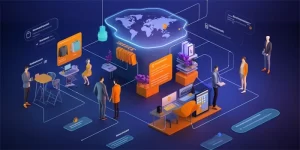Shipping has been an integral part of the global economy for centuries, but it is on the verge of a major transformation. Investing in cutting-edge technology and container solutions is the key to shaping the future of this industry. In this article, we will explore how these advancements will revolutionize shipping and contribute to a more efficient and sustainable future.

1. Smart Containers: Enhancing Visibility and Efficiency
Smart containers equipped with sensors and Internet of Things (IoT) technology will enable real-time tracking and monitoring of shipments. This will enhance visibility, allowing companies to optimize their supply chain and improve delivery times. Additionally, IoT-enabled containers can provide valuable data on temperature, humidity, and security, ensuring that goods remain in optimal conditions during transit.
By embracing smart containers, shipping companies can reduce theft, spoilage, and delays, ultimately saving costs and boosting customer satisfaction.
2. Blockchain: Securing and Streamlining Transactions
Blockchain technology is set to revolutionize shipping by providing secure and transparent transactions. The decentralized nature of blockchain ensures that all parties involved in a shipment can access and verify data, eliminating the need for intermediaries. This will significantly streamline processes, reduce paperwork, and prevent fraud.
Blockchain has the potential to simplify documentation, such as bills of lading and customs paperwork, making international trade more efficient and less susceptible to errors.
3. Artificial Intelligence: Optimizing Route Planning
Artificial intelligence (AI) algorithms can analyze vast amounts of data, including weather forecasts, historical shipping data, and real-time traffic information, to optimize route planning. By considering factors like fuel efficiency, weather conditions, and port congestion, AI can help shipping companies determine the most efficient routes, reducing fuel consumption and carbon emissions.
AI can also assist in predicting maintenance needs, enabling proactive repairs and minimizing downtime.
4. Autonomous Ships: Revolutionizing Maritime Transport
Autonomous ships, or unmanned vessels, have the potential to revolutionize maritime transport. By removing the need for human crew, autonomous ships can operate efficiently and continuously, reducing operating costs and increasing productivity. These ships can be remotely monitored and controlled, ensuring safe navigation and minimizing the risk of accidents.
However, the widespread adoption of autonomous ships will require significant changes in regulations and infrastructure to address concerns regarding safety, cybersecurity, and liability.
5. Green Shipping: Embracing Sustainable Practices
The shipping industry is under increasing pressure to reduce its environmental impact. Investing in green technologies, such as alternative fuels, wind propulsion, and solar energy, can significantly reduce carbon emissions. Additionally, implementing energy-efficient practices, such as slow steaming and optimizing ship design, can further enhance sustainability.
By embracing sustainable practices, shipping companies can not only contribute to a greener future but also meet regulatory requirements and enhance their brand image.
6. Drone Delivery: Revolutionizing Last-Mile Logistics
Drones have the potential to revolutionize last-mile logistics by enabling faster and more cost-effective delivery of goods. In urban areas, drones can navigate through traffic and deliver packages directly to customers, eliminating the need for traditional delivery methods.
However, challenges such as regulatory frameworks, airspace management, and payload limitations need to be overcome before drone delivery becomes a widespread reality.
7. Robotics and Automation: Enhancing Port Operations
Robotic technologies and automation can streamline port operations, increasing efficiency and reducing labor costs. Automated cranes, robotic container handling, and autonomous vehicles can optimize cargo handling processes, minimizing human errors and maximizing productivity.
This shift towards automation will require training and re-skilling of the workforce to adapt to the changing nature of jobs in the shipping industry.
8. Predictive Analytics: Mitigating Risks and Optimizing Operations
Predictive analytics can help shipping companies identify and mitigate potential risks, such as equipment failure, weather disruptions, or port congestion. By analyzing historical data and utilizing real-time information, predictive analytics can provide insights to optimize operations, improve safety, and reduce costs.
Shippers can proactively plan for disruptions and make informed decisions to minimize downtime and losses.
9. 3D Printing and On-Demand Manufacturing: Redefining Supply Chain
Advancements in 3D printing technology have the potential to redefine the supply chain by enabling on-demand manufacturing. With the ability to produce spare parts and components locally, 3D printing reduces the need for extensive inventories and long lead times. This can significantly decrease shipping costs and improve supply chain resilience.
Shipping companies can adapt to this trend by integrating 3D printing capabilities into their operations and collaborating with 3D printing manufacturers.
10. Remote Surveying: Streamlining Inspections and Maintenance
Remote surveying using drones and remote-controlled robots can streamline inspections, maintenance, and repairs of ships and port infrastructure. This technology reduces the need for manual inspections, improving safety, reducing costs, and minimizing downtime.
Shippers can employ remote surveying to detect and address issues before they escalate, ensuring smooth and uninterrupted operations.
Frequently Asked Questions:
Q: How will the use of smart containers benefit the shipping industry?
A: Smart containers provide real-time tracking, enhance visibility, and improve the security of shipments. This enables companies to optimize their supply chain, reduce theft, and ensure goods remain in optimal conditions during transit.
Q: What are the challenges of implementing autonomous ships?
A: Autonomous ships face challenges related to regulations, infrastructure, safety, cybersecurity, and liability. Overcoming these challenges is crucial for the widespread adoption of unmanned vessels.
Q: How can the shipping industry reduce its environmental impact?
A: The shipping industry can reduce its environmental impact by investing in green technologies, implementing energy-efficient practices, and embracing sustainable practices like alternative fuels, wind propulsion, and solar energy.
Q: How can predictive analytics help shipping companies?
A: Predictive analytics can help shipping companies by identifying and mitigating potential risks, optimizing operations, improving safety, and reducing costs. By utilizing historical and real-time data, shippers can make informed decisions and proactively plan for disruptions.
Q: What role does 3D printing play in the future of shipping?
A: 3D printing has the potential to redefine the supply chain by enabling on-demand manufacturing. With the ability to produce spare parts locally, shipping companies can reduce the need for extensive inventories and long lead times, leading to reduced costs and improved supply chain resilience.
References:
1. The Future of Shipping: A Revolution is on its Way – World Economic Forum
2. Digitalization in Shipping: A Game Changer in Supply Chain – International Chamber of Shipping
3. Maritime Autonomous Systems – International Maritime Organization






